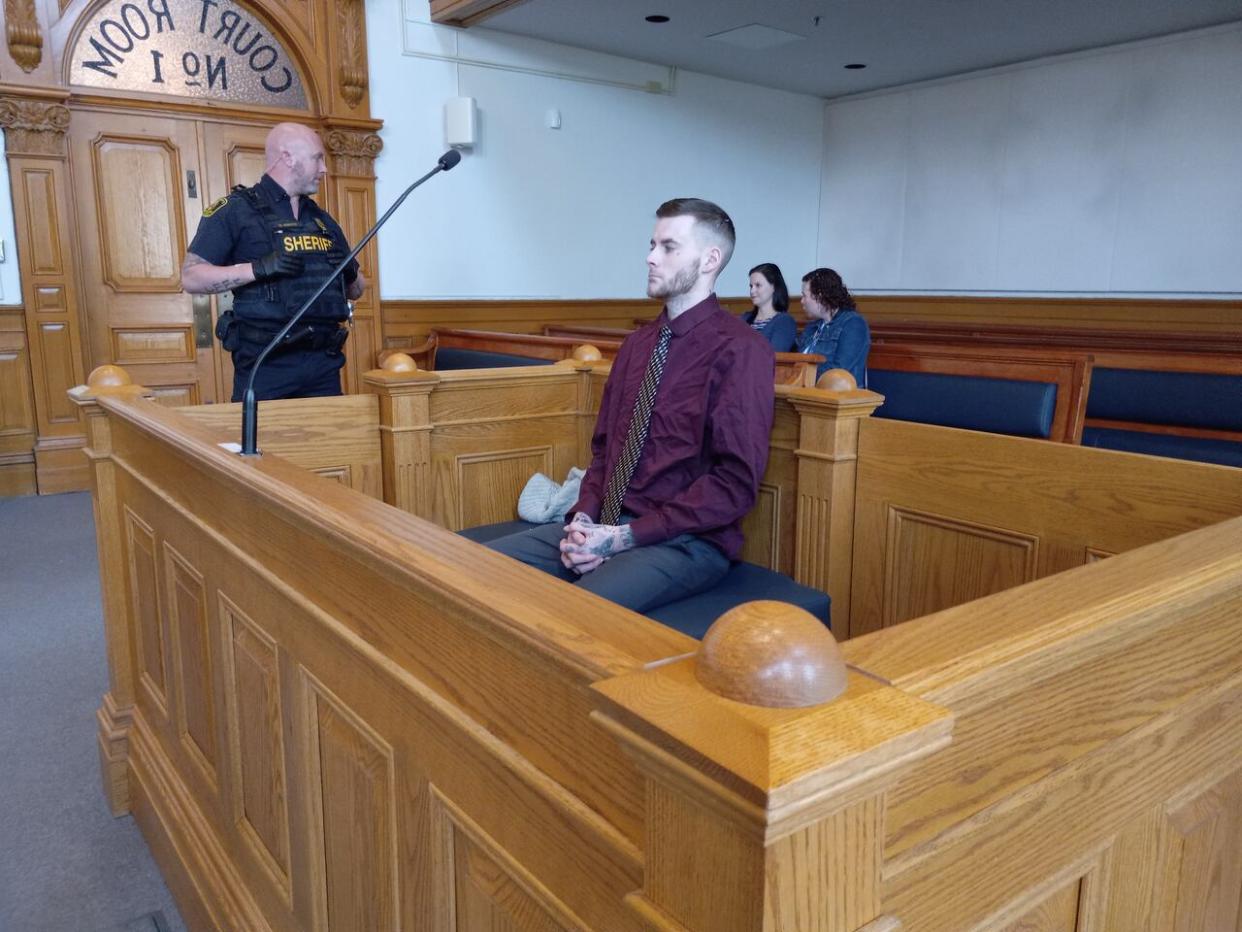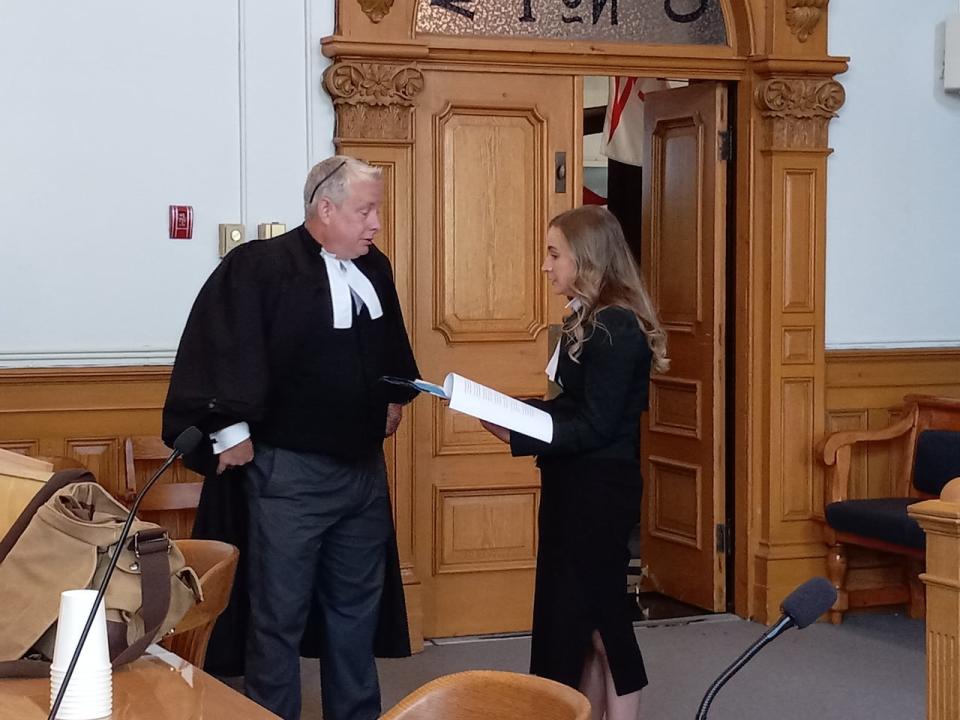'Hellhole' prison conditions should factor into manslaughter sentencing, argues lawyer

Sheldon Hibbs was back in a St. John's courtroom Tuesday morning as lawyers debated how long he should spend in jail for manslaughter — with defence counsel focusing on the conditions at Her Majesty's Penitentiary.
Legal Aid lawyer Jason Edwards, representing Hibbs, said a four- to six-year prison sentence would be appropriate, given the time his client has already spent in the deteriorating prison.
"HMP is, by all accounts, a hellhole," he told the court. "We should be ashamed of how HMP treats people and how we've allowed it.
"Inmates should not be subjected to mould. The heat. Cold. Rodent infestations. They should not be bitten by rodents."
Hibbs pleaded guilty in March to manslaughter, accepting a plea deal that saw his charge downgraded from second-degree murder in the death of Michael King, 68. King's body was discovered on a trail between Waterford Valley High School and Holbrook Avenue in the west end of St. John's on May 30, 2021.
Edwards argued Justice Vikas Khaladkar should consider the prison's conditions in sentencing.
While incarcerated, Edwards said, it took Hibbs a year before he was able to see a psychiatrist. Edwards said his client was also unable to attend Alcoholics Anonymous or Narcotics Anonymous meetings because they were cancelled due to lack of staff.
"Perhaps one of the most egregious things I ever saw is lack of access to legal counsel," said Edwards.
There were times when he went to visit Hibbs in prison but staff weren't available to escort him inside, he said. In other instances, the single room provided to meet his client wasn't available.

He also said he wasn't able to reliably stay in contact with his client, who had to use a public telephone kept in the guard house that didn't always work. Taking calls next to correctional officers meant those conversations couldn't be confidential.
Edwards said he wants in-house credit to reflect HMP conditions and how they negatively impacted Hibbs's physical and mental health.
"It's to his credit that he's done what he can," said Edwards.
If the prison is really just a warehouse, he said, then "just give up the facade of trying to rehabilitate people. If so, fine. Let's call it what it is."
Edwards also said Hibbs's personal life — using drugs from the age of 14, kicked out of his home and living alone by the age of 16 — should also be a mitigating factor. He added his client didn't have a criminal record before being charged with King's death.
Edwards also said King had attempted to sexually assault Hibbs, who has said he has been sexually assaulted in the past.
Hibbs has since been diagnosed with attention deficit disorder, anxiety disorder, post-traumatic stress disorder, borderline personality disorder and antisocial personality disorder, said Edwards, and had been self-medicating for years.
While in Alberta, Hibbs was addicted to methadone and crack cocaine and was undergoing withdrawal when police tried to put him on a commercial flight, said Edwards. An ensuing incident resulted in Hibbs being banned from commercial flights, and the Royal Newfoundland Constabulary had to charter a $91,000 plane to return Hibbs to the province.
"He was a mess," said Edwards, adding that he had meetings with Hibbs that Hibbs does not remember.
But his client has made progress and is genuinely remorseful over causing King's death, he said.
Crown seeking 7-9 years
Crown attorney Ashley Targett is seeking a seven- to nine-year sentence and listed a number of aggravating factors, including the level of violence in the crime and Hibbs's attempts to cover it up.
"The beating itself was excessive. The level of the beating was unprovoked. The beating itself amounted to gratuitous violence," said Targett.
Hibbs had previously said he was angry and triggered, not fearful, and the attack was not in self-defence, said Targett.
"With respect to the provocation aspect, I note the accused stated in the past that the victim had tried to get on top of him, and kiss him and touch his penis."

She also cited an autopsy report that said King had several broken bones, including rib fractures and a skull fracture. King was also an older man who was intoxicated at the time of his death, Targett said, made him vulnerable.
Hibbs didn't offer medical aid to King or call 911, she said, and left the province.
She is also seeking a DNA order and firearms prohibition.
Hibbs expresses remorse
Hibbs, who spent most of the sentencing submission hearing staring straight ahead, told the court he was sorry for King's death.
If he'd been sober and in a sound state of mind, he said, the death wouldn't have happened, adding nothing he can do or say will change that.
"I will live with this for the rest of my life," said Hibbs, adding he intends to remain sober.
Hibbs is due back in court on June 26.
Download our free CBC News app to sign up for push alerts for CBC Newfoundland and Labrador. Click here to visit our landing page.


